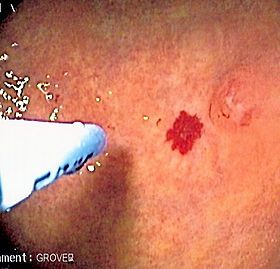Argon plasma coagulation
| Argon plasma coagulation | |
|---|---|
 Argon plasma coagulation administered via probe through the colonoscope at an angiodysplasia in the colon. The patient had multiple colonic angiodysplasiae in the setting of aortic stenosis. | |
| Other names | APC |
| Specialty | Gastroenterology |
Argon plasma coagulation (APC) is a medical endoscopic procedure used to control bleeding from certain lesions in the gastrointestinal tract. It is administered during gastrointestinal endoscopy such as esophagogastroduodenoscopy or colonoscopy.
Medical use
APC involves the use of a jet of ionized argon gas (plasma) directed through a probe passed through the endoscope. The probe is placed at some distance from the bleeding lesion, and argon gas is emitted, then ionized by a high-voltage discharge (approx 6kV).[1] High-frequency electric current is then conducted through the jet of gas, resulting in coagulation of the bleeding lesion. As no physical contact is made with the lesion, the procedure is safe if the bowel has been cleaned of colonic gases,[2][3] and can be used to treat bleeding in parts of the gastrointestinal tract with thin walls, such as the cecum.
See also
References
- ^ "Post-Radiation Colitis". El Salvador Atlas of Gastrointestinal Video Endoscopy. Archived from the original on 3 July 2014.
- ^ Ladas SD, Karamanolis G, Ben-Soussan E (October 2007). "Colonic gas explosion during therapeutic colonoscopy with electrocautery". World Journal of Gastroenterology. 13 (40): 5295–8. doi:10.3748/wjg.v13.i40.5295. PMC 4171316. PMID 17879396.
- ^ Ben-Soussan E, Antonietti M, Savoye G, Herve S, Ducrotté P, Lerebours E (November 2004). "Argon plasma coagulation in the treatment of hemorrhagic radiation proctitis is efficient but requires a perfect colonic cleansing to be safe". European Journal of Gastroenterology & Hepatology. 16 (12): 1315–8. doi:10.1097/00042737-200412000-00013. PMID 15618838. S2CID 9655672.
Further reading
- Peng Y, Wang H, Feng J, Fang S, Zhang M, Wang F, Chang Y, Shi X, Zhao Q, Liu J (2018). "Efficacy and Safety of Argon Plasma Coagulation for Hemorrhagic Chronic Radiation Proctopathy: A Systematic Review". Gastroenterology Research and Practice. 2018: 3087603. doi:10.1155/2018/3087603. PMC 5845516. PMID 29681929.
